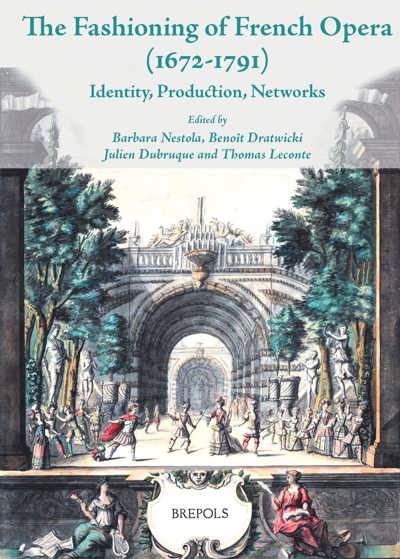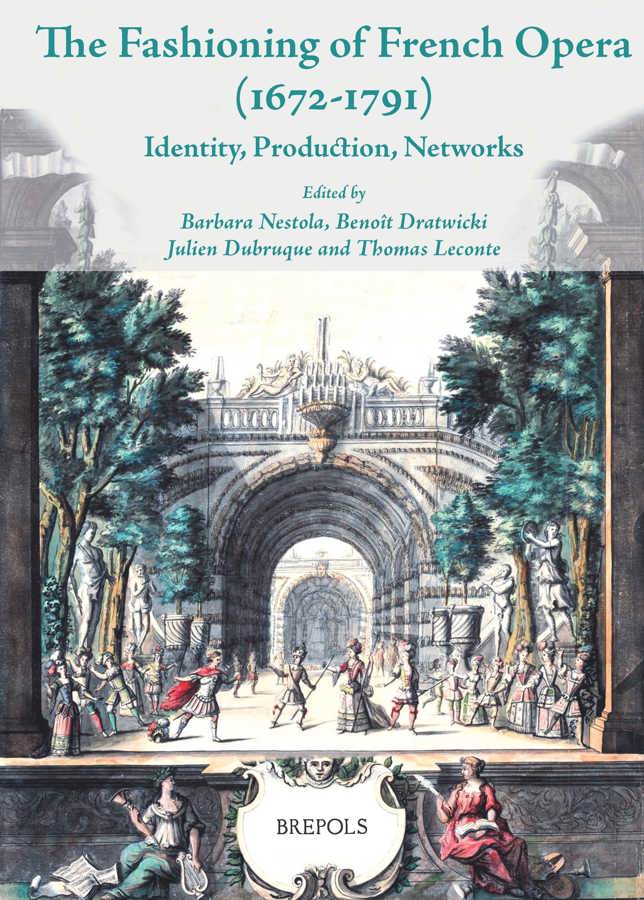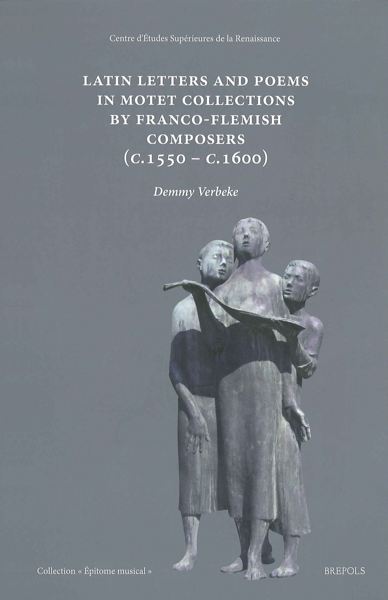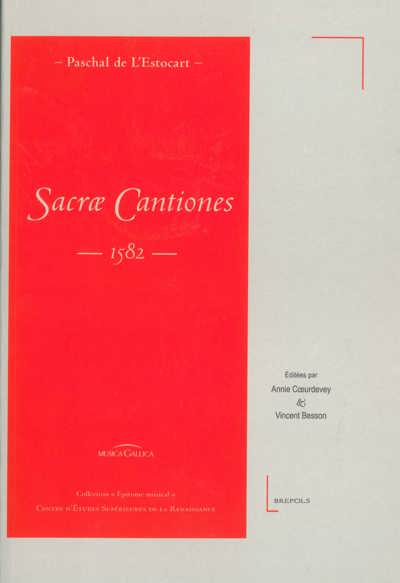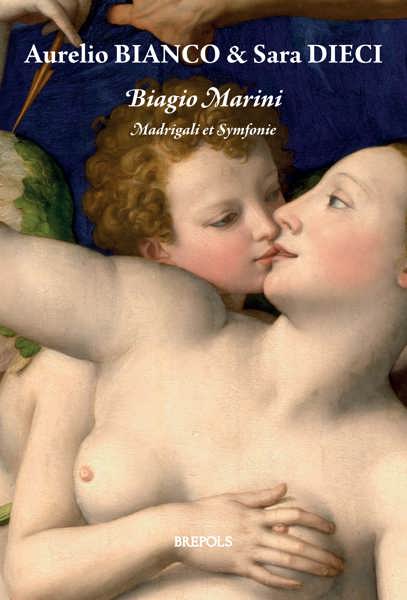
The Fashioning of French Opera (1672-1791)
Identity, Production, Networks
Barbara Nestola, Benoît Dratwicki, Julien Dubruque, Thomas Leconte (eds)
- Pages: 440 p.
- Size:178 x 254 mm
- Illustrations:36 b/w, 23 col., 27 tables b/w., 8 exemples musicaux
- Language(s):English, French
- Publication Year:2023
- € 90,00 EXCL. VAT RETAIL PRICE
- ISBN: 978-2-503-60478-7
- Paperback
- Available
"Der umfassende Band demonstriert die Vielgestaltigkeit und Komplexität einer kulturwissenschaftlich ausgerichteten Operngeschichtsschreibung. Er kann als beispielhaftes Modell dienen, den Blick auf Werk und Autorin oder Autor um weitere Perspektiven zu bereichern. (...) Die fundierten, quellengestützten Analysen ein Kompendium zur Académie royale de musique bieten, das als unverzichtbarer Referenzpunkt für weiterführende Forschungen dienen wird." (Nastasia Heckendorff, in Francia-Recensio, 2024/3)
"This diverse collection pulls back the curtain to give the reader a peek into the tumultuous workings and lasting influence of the Académie royale de musique. Each author brings to light a part of the organization’s massive undertaking with an interdisciplinary focus on the relationships, both between entities and individuals, that allowed the Opéra to function. (...) The amount of information is truly immense. (...) There are countless areas of study to pursue after this project..." (Celina Vargas, in The French Review, 98(2), 2024, p. 189)
"Our French colleagues have wanted to demystify a famous secular temple and the rites performed within it. The least we can do is to take up their invitation to join them." (David Charlton, in Music and Letters, 106/2, 2025, p. 330)
As the forerunners to the Paris Opera, the Académie d’opéras (1669–1672) and the Académie royale de musique (1672–1791) inspired first historical then aesthetic research, research that appeared very steadily through the eighteenth, nineteenth, and twentieth centuries. At the beginning of the twenty-first century, researchers and performers alike began to change their perspective on the institution and its legacy, shifting away from the Académie’s image as a tool used in the propaganda machine and towards a focus on aspects of performance practice. However, despite the scale and diversity of the current body of scholarship, many facets of the Académie royale de musique remain unexplored. It was first and foremost a cultural institution, one that developed its own identity and savoir-faire, some aspects of which still need to be uncovered.
This study aims to reconsider the institution from a new angle, thanks to an interdisciplinary approach and three sustained motivations: questioning the institution’s very nature, as well as its place and status in the French academic network; highlighting practical, logistical, and material questions as yet unexplored; and reevaluating not only its interactions with other theaters in Paris, at court, and in the provinces, but also the ways its repertoire spread in general. For once, poets and composers are not the main subject. We choose to concentrate instead on those who helped the pieces to exist and to come to life: directors and administrators, performers, teachers, and craftsmen. The papers focus on their hierarchical relationships, their decision-making authority, and their respective responsibilities, in order to better understand all that the fashioning of operas entails.
Le développement de l’opéra en France est intrinsèquement lié à l’histoire de l’Académie royale de musique de Paris : le genre et l’institution naissent et évoluent en parallèle, se nourrissant l’un de l’autre. L’institution en tant que telle reste cependant moins étudiée : son administration, son modèle économique, sa gestion des carrières et des compétences, son personnel (artistes, artisans, maîtres de chant et de danse, employés), ses fournisseurs, son organisation quotidienne, l’interaction entre les corps de métier qui la composent (et notamment la notion de responsabilité, de droit ou de fait, incombant à chacun), son évolution dans le temps, la diffusion de son répertoire et de son image fournissent autant de pistes à explorer. Ces aspects sont déterminants pour comprendre la nature de l’institution, mais aussi celle de son répertoire. À la différence des autres académies établies par Louis XIV, l’Académie royale de musique est en effet avant tout une entreprise culturelle, qui « fabrique du spectacle » avec des contraintes de production, de rentabilité et d’attractivité. Unique théâtre de répertoire en Europe à l’époque, elle entretient des forces artistiques permanentes (orchestre, ballet, troupe) et gère des fonds considérables (musique, décors, costumes). Le succès public dépend tout autant de la qualité du spectacle et de l’interprétation que de la valeur intrinsèque du poème et de la musique. Ce fonctionnement particulier place l’œuvre au croisement de multiples considérations pragmatiques, dont l’étude permet de réévaluer le geste créateur et la notion d’œuvre elle-même. C’est ce que le CMBV a souhaité mettre en valeur dans un ouvrage collectif interdisciplinaire.
Barbara Nestola, Benoit Dratwicki, Julien Dubruque, Thomas Leconte
Introduction
Thomas Leconte
Identity: An Unconventional Academy
Benoit Dratwicki
Production: Authority and Responsibility in the Fashioning of Opera
Barbara Nestola
Networks: An Interactive Academy
Identity
directed by Thomas Leconte
Thomas Vernet
“Raise Music to the Heights We Had Promised Ourselves:” The Singular Voice of the Académie Royale de Musique
Laurent Guillo
The “Two Bodies” of the Académie Royale de Musique or “Les Caractères de la Transcendance”
Lola Salem
Regulating Singers’ Pensions at the Opéra: Royal Arbitrage and Administrative Law
Francoise Dartois-Lapeyre
Two Interacting Academies: The Académie Royale de Danse and the Académie Royale de Musique
France Marchal-Ninosque
Creating Dance Professionals in the Capital City: The Paris Opera’s School of Dance at the Heart of a Late-Eighteenth-Century Monopoly
Pascale Cugy
Impressions of Celebrities: Opéra Actors and Spectators in the Parisian Fashion-Plate Under Louis XIV 95
Gregoire Ichou, Jean-Michel Vinciguerra
From Name to Image: Portraits of Singers and Dancers Attached to the Paris Opera (1715–1791)
Production
directed by Benoît Dratwicki and Julien Dubruque
Pascal Denecheau
Dealing With Jean-Baptiste Lully’s Legacy: Francine and the Directors of the Paris Opera From 1687 to 1733
Sylvie Bouissou
Aesthetic Stakes Meet Economic Obligation: Director’s Policies at the Académie Royale de Musique (1733–1791)
Benjamin Pintiaux
The Making of the Libretto, From Beaujoyeulx to Pellegrin: Prolegomena to a Poietic Analysis of Opera Lyrics
Thomas Soury
Opera Poet: An Author Without Authority?
Loic Chahine
Reversing the Authorship: The Case of the Divertissement
Julien Dubruque
Performers and Composers: The Members of the Petit Choeur Between Lully and Rameau
Rebecca Harris-Warrick, Laura Naudeix
Ballet Masters at Work, 1672–1764
Graham Sadler
The Role of the Maitre de Musique: Evidence From the Académie Royale de Musique’s Performing Material
Benoit Dratwicki
Operas under Construction: Rehearsal Procedures and Methods at the Académie Royale de Musique
Benoit Dratwicki
Singers, Composers and Repertoire
Barbara Nestola
Rising Stars: Added Airs as a Strategy for Singers’ Self-Promotion
Francoise Escande
Preserving the Repertory at All Cost: When Berton and Dauvergne Were Bringing Destouches up to Date
Networks
directed by Barbara Nestola
Barbara Nestola
The World of Opera in the Repertory of the Comédie-Italienne: Appropriation, Reinterpretation, and Synthesis of Operatic Codes (1690–1697) 295
Judith le Blanc
The Opéra as Reflected in Theatrical Parodies and Critiques
Pauline Lemaigre-Gaffier
From Gift to Mutualized Management: The Menus-Plaisirs at the Service of the Académie Royale de Musique
Lois Rosow
The Royal Court, the Opéra, and the Opéra’s Copyists in the Mid-Eighteenth Century: Lallemand and Durand as Independent Contractors
Petra Dotlačilova
From the Idea to the Fabric. Costume Making at the Opéra and Exchanges With Other Parisian Stages
Natasha Roule
The Performance and Adaptation of the Tragedie en Musique for French Provincial Stages (1684–1750)
Benedicte Hertz
The Académie Royale de Musique of Lyon Confronted to the Parisian Model: “Giving Form to the Theatrical Spectacle” in a French City (1739–1750)
Sources and Bibliography
Literary and Musical Sources
Archives
Sources and Studies
Abstracts
Index of Works
Index of Names
